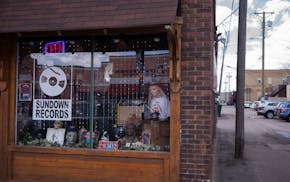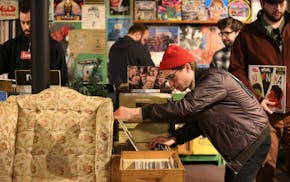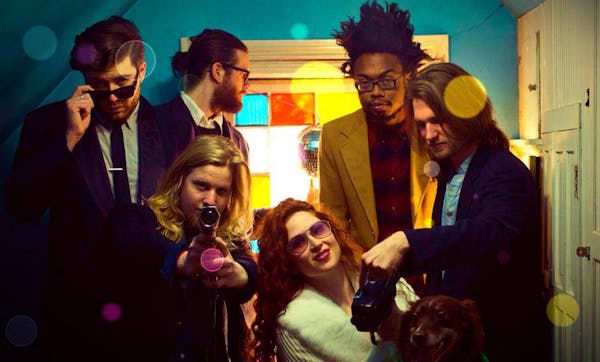Considering he's Canadian-born with a Tanzanian mother and a South African father, and moved around a lot before graduating from suburban Woodbury High School, it came as no surprise when Allan Kingdom admitted he never feels like he fits in.
"I can adjust pretty easily to different environments, but I never feel like I'm truly a part of one society," said the 20-year-old budding rapper, whose real name is Allan Kyariga.
He certainly doesn't fit in neatly with the Twin Cities hip-hop scene. Which might be why there's such a heavy buzz on him. He was one of six acts selected to play First Avenue's annual Best New Bands showcase next Thursday.
A sign of his outcast status, he met us at his friend Checho's house in a blue-collar neighborhood just up the hill from the railroad tracks that served South St. Paul's stockyards in their glory days. Not exactly a rap mecca, it's where he does a lot of his writing and some of his recording, in a home studio built into the converted attic. Allan already has one full-length record and four different EPs to his name.
More proof he's removed from the hipster hubbub of Minneapolis rap: When he got to talking about the album he is currently making with producer Ryan Olson (Gayngs, Poliça, Marijuana Deathsquads, Lizzo), he couldn't remember the names of the other musicians involved — names that most other young musicians in town would brag about, such as DeVon Gray, Joey Van Phillips, Jim Anton and Jake Luck.
"It's always great when a new local artist just pops up out of nowhere on your radar, and Allan seemed to have just sprouted up one day from way left field," said Poliça's Drew Christopherson, who helms the label likely to release the Olson/Kingdom album, Totally Gross National Product, now enjoying the momentum of Lizzo's record.
Allan's "left-field" style of music boasts subtle traces of East Africa — "stuff my mom listened to when I was growing up," he said — alongside some of hip-hop's modern innovators, including the sexy electro-rap of Frank Ocean, the personal, messy youthfulness of Ocean's Odd Future mate Earl Sweatshirt, and the hazy and fantastical work of Cleveland rapper Kid Cudi.
The latter influence is especially apparent given the fact that Allan calls one of Cudi's producers, Plain Pat, his manager. Pat got turned on to Allan's music via Twitter and flew to Minneapolis to attend his first-ever headlining show at the Beat Coffeehouse.
"He told me, 'I'm very intimidated by your production,' " remembered Allan, who was only 17 then. "I was blown away."
Allan earned attention last fall with his official remix of Poliça's "Chain My Name." As a live performer, he has turned heads in recent months with opening gigs for the likes of Four Fists (P.O.S. and Astronautalis), Flatbush Zombies and even trashy, rowdy character-rapper RiFF RaFF, with whom Allan surprisingly hit it off after the show. "That really is him. He doesn't turn off his act when he's off stage," noted Allan.
As for Allan, he's way more subdued and solitary off stage, with an affable charm that even RiFF RaFF must have noticed. He says the only reason he ever goes out beyond his close group of friends is because "I figure you have to go out and meet people if you want to make yourself known."
"Whenever he goes out, he'll always be saying to people, 'Oh, yeah, I got another album coming,' " said his friend Diosnel Campoalegre, also a regular at Checho's (Sergio Freire's) home studio. "And he's always working on something. He's probably only released like 20 percent of what he's created. You can imagine how much there is if there's another 80 percent going unheard."
Allan met his pals at St. Paul's Creative Arts High School, which he attended for a while before going back to Woodbury. He also studied studio engineering at the Institute of Production & Recording in Minneapolis through a free program for high schoolers.
An only child, he has rarely spent time with his father, who moved back to South Africa early in Allan's childhood. His parents met while studying at the University of Manitoba in Winnipeg, where Allan lived until the third grade (you can still hear traces of a Canadian accent).
His mom, Laurencia, has taken Allan to Tanzania a few times and rooted him in her native culture. Mentioning Congolese musicians such as Koffi Olomide and Papa Wemba, Allan said, "When I first started releasing music, people would say they could hear that influence, and it was totally a subconscious thing for me. But I figured, 'OK, then I might as well own it.' I started listening to a lot of that stuff on my own then."
Mom had another unique influence on Allan's early recordings, including a rap album he made through his church when he was about 11. "She would go through the lyrics and say, 'Oh, you can't say that.' She'd change the words she didn't like to 'love' and 'Jesus' and 'God.' "
There's still very little raunchiness in Allan's material. His full-length debut from two years ago, "Trucker Music," was a playful, bravado-laden, Kanye-influenced collection that showed mature talent but still had a teenage mind-set.
His latest EP from July, "Talk to Strangers," boasts more provocative and worldly lyrics, with highlights including the work-ethic homage "I Should Be a Pusha" and the loopy, boy-to-man digital romp "Mediocre."
The latter song, he said, "is about insecurities, and how I have more respect for people who show me their insecurities than hide them."
Asked if he's the one afraid of being "mediocre" in the song, Allan said, "Yeah, I'm opening up there. I want to get all my secrets out right away so people know who I am and what I'm about right up front."
There's a lot more to learn about him yet, it seems, but at least one big secret is out.
chrisr@startribune.com • 612-673-4658

Legendary record store site in Minneapolis will soon house a new shop for musicheads

5 vinyl shops in greater Minnesota worth a spin for Record Store Day

What to know and seek for Record Store Day 2024 in the Twin Cities


